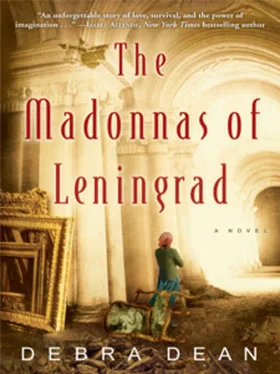“Can you see them?” She points. “Over there is Zeus with his thunderbolts. No?”
On the spot, she devises a new tour for the boys and their teachers, starting with what remains in the denuded museum.
“Follow me,” she says, “and stay close to me or the captain. It’s treacherous in the dark if you don’t know your way.”
She leads them down the Rastrelli Gallery, once a confection of receding arches and light, now a dark maze stacked high with crates, the art bound for the third train that never made it out of the city at the start of the war. They turn left through the Hall of Egyptian Art, passing between a pair of imposing black granite sarcophagi, and from there they descend narrow service stairs into a cellar.
“Watch your step,” she says. “This is the repository of Western European statuary,” she announces. She holds up her lantern to reveal a low-ceilinged room crowded with marble angels and nymphs, Roman senators and queens. “They were brought down here to keep them safe from the bombs.” The statues are arranged in rows facing the same direction, full torsos on pedestals in the rear, busts down in front. A pensive young woman, a hand to her cheek, is seated next to a gallantly posed war hero; the bust of a handsome Roman gazes over the head of a young maiden. A prone Satyr lounges in the front row. In the hissing light of the kerosene lantern, they look like an audience at the cinema watching a silent film.
The boys take turns stepping into the small room and looking at the statues.
“Who’s that in the second row?” she quizzes them.
“Catherine the Great,” they respond in a chorus.
“And there is Aphrodite. And Cupid.”
They cross under the Hanging Gardens and into the New Hermitage building, where she gathers them in a half circle under the rim of a gargantuan vase that dominates the center of the room. The lip of the vase looms high above their heads.
“This is called the Kolyvan vase. It is made of green jasper and is generally considered to be the finest example of Russian stone carving. The craftsmen of the Kolyvan Lapidary Works created this especially for a room upstairs, but it is made of nineteen tons of green jasper, and it was feared to be too heavy for the upstairs. ‘Maybe we should just leave it here,’ they decided. All spring, it has been filling up with water from the leaks, and every few days the staff here must climb a ladder and bail it out. But we are thinking of turning it into an enormous birdbath,” she jokes.
The boys look at her, solemn-eyed, and nod as though this is a reasonable solution.
They are very serious, even the younger ones. At first Marina wonders if they are bored, but they don’t fidget or whisper or surreptitiously punch one another’s shoulders as boys will do. When Marina talks to them, they listen raptly, taking it all in with their deep, round eyes. In their young lives, they have already seen too much, and it has given them a slow and haunted demeanor. Even so, they have never seen things such as this. Their eyes widen at each new wonder.
They trail after her through the dim Jupiter Hall, crowded with hundreds of vases made of precious metals and stone and presided over by the towering gold and marble statue of Jupiter. It is like being undersea, with muted light filtering down through a few unbroken panes just below the ceiling and reflecting off the green stone walls.
“The walls are artificial marble,” she informs them, “made by a special process mixing marble dust and concrete and dyes. Each of the rooms down here has walls of a different color: here rose colored”-she gestures as they pass through the Ancient Courtyard-“and up here, in the Hall of Dionysus, it is the color of coral. This is a wonderful room. I think it is like being inside the mother’s womb, very red and dark and safe.
“Do you wish to see more?” The boys nod, mute but eager.
The captain, an elderly man in a long fur-collared coat, speaks up. “You are very generous, comrade, but we don’t wish to overtire you in your condition.”
She assures them that she is not tired at all, and, amazingly, she is telling the truth. She feels as though she could walk her charges through every single room of the museum if only they would follow. There is so much she wants to show them. So she leads them up the Main Staircase to the picture gallery on the first floor, holding up her lantern to guide them. Their footsteps echo on the parquet floors. Rows of dusty gilt frames line the barren walls.
“This is my favorite part of the museum, though it may be hard to see why. From here on out, you will have to rely entirely on your imagination.”
She walks them into the Rubens Room and stops before an empty frame. The boys look bewildered. Drawing a deep breath, she silently wills up the image. Gradually, a picture takes shape for her inside the frame. It is Rubens’s portrayal of Andromeda being rescued by the warrior Perseus. A wonderful winged horse slowly surfaces on the blank green wall inside the frame. Then the decapitated head of the gorgon and the open mouth of the sea monster in the foreground. This will appeal to boys, she decides.
She begins to sketch out the painting for them. Starting at the left edge, she describes the beautiful princess posed with one hand shyly covering her privates, her eyes downcast before the smitten Perseus.
“She is a princess and was about to be sacrificed to a sea monster. Perseus just happened to be flying over the sea on his winged horse-he had been off killing the evil gorgon, whose head is impaled on his shield here. The head is still alive and the face is terrified.” She makes a horrible face. “So Perseus looked down, and he saw the beautiful Andromeda chained to a rock, and he fell instantly in love. He flew down and rescued her by slaying the sea monster. Here, at the bottom of the painting, is the dead monster. He is green and very ugly, and his eyes are bulging.”
As she talks, she sees that one of the boys in particular is transfixed, a flush spreading across his cheeks. She is encouraged. She asks them to picture the angel placing a wreath on the hero’s head and the little putti that busily attend the scene. They are draping garments over the modest young woman and holding the reins of Pegasus, the winged horse.
“This one little putto looks frightened that he will be stepped on. Pegasus is such a lively horse. His flesh is slick and quivering, and his hooves are lifting off the ground. He has huge white wings, and they are poised for flight. Any second now he will lift into the sky. You can just feel it. In fact, everything in the painting is moving. You almost feel that if you turned away, and then turned back again, the painting would be different.” She moves on, but as she walks away she sees that one of the younger boys has lingered behind. He whips his head back and forth as though he may catch a glimpse of something if only he is fast enough.
She skips down a few frames and holds up her lantern. “This is the spot where the painting Bacchus hung. Does anyone know who he was?”
One boy volunteers that he was the Roman god of wine.
“Yes, that’s right. So this is a picture about drinking. Bacchus is holding up an enormous gold goblet, and it is being filled by one of his Bacchae. The Bacchae were his female attendants. And poised directly under the goblet here is a young cupid catching the spilled wine in his mouth, and another one here is urinating.” She sees one boy stifle a smirk. “Over here is Pan, and he is pouring a river of wine into his open mouth. They are all very drunk. Look, even the leopard is drunk.” She corrects herself. “In the painting, there is a leopard right here under Bacchus’s foot, and he is chewing on a grapevine like a drunken kitten.
Читать дальше












